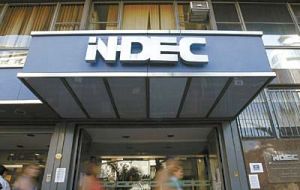MercoPress. South Atlantic News Agency
Argentine inflation cooling as economy slows down
 “Official” June inflation was 0.4%, while private estimates put it at 0.6%
“Official” June inflation was 0.4%, while private estimates put it at 0.6% Argentina’s official consumer inflation in June was 0.4%, totalling 5.3% in the last twelve months and 2.7% in the first half of this year, according to the latest release from the controversial Statistics and Census Office, Indec.
However private estimates are not so optimistic and estimate June’s consumer price index to have risen 0.6% and 6.3% in the first half of the year. The Buenos Aires City Research Institute (which depends from the Economics School of the Buenos Aires University) is headed by Graciela Bevacqua, who was sacked from Indec a couple of years ago for allegedly releasing statistics that did not please the Kirchner couple.
The Institute’s annual inflation projection based on the first half of the year is in the range of 13%, but as recession takes grip, Bs. As. City Research believes it will be closer to 10%.
Items which experienced the strongest impulse were Food and beverage, 1.1%, pushed by all flour related products including bread and pasta, cooking oil, fresh vegetables, dairy produce and infusions. Home equipment and maintenance items increased 0.8% (heaters, kitchens, refrigerators, etc); leisure, 0.8%; clothing, 0.5%; housing, 0.4%; medical services, 0.4%; transport and communications 0.3% and education, 0.2%.
Regarding wholesale produce, Indec revealed that June prices jumped 0.9% over May. Domestic produced goods increased 1%, manufactured goods 1.5% and power 0.9%.
Anyhow in the first half of 2009 wholesale prices were up 3.1% and 5.4% in the last twelve months mainly because of the economic retraction in Argentina.
The construction cost index in Buenos Aires city was up 1% in June compared to the previous month, mainly because of an increase in materials, 0.4% and 1.8% in labour.
In the first half of 2009 construction costs increased 4.4% and 10.5% in the last twelve months.
In related news a private economics advisory group estimated that economic activity in Argentina contracted 5.5% in June compared to a year ago, having accumulated in the first six months a negative growth of 5.8%.
Centro de Estudios Orlando Ferreres points out that the fall in June is steep because a year ago was the climax of the government-farmers confrontation that virtually paralyzed trading of agriculture commodities and related industries.
However the consultants estimate the Argentine economy will be touching bottom in the second half of the year and begin to rebound in 2010, “albeit gradually and in line with the global economy”.
June also marks the third consecutive month of negative growth, according to Orlando Ferreres, which technically means the economy is entering recession.
The release finally indicates that while in 2008 Argentina was concentrated in its own domestic problems, the farmers’ conflict and inflation, towards the end of the year, the global financial crisis moved top of the agenda.
Orlando Ferreres also expects a significant impact on economic activity from the A/H1N1 virus influenza that has forced several industry sectors to close down.




Top Comments
Disclaimer & comment rulesCommenting for this story is now closed.
If you have a Facebook account, become a fan and comment on our Facebook Page!